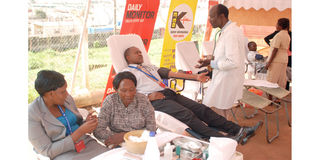Prime
How Monitor’s dogfight has built Uganda

Ms Martha Elimu (left), then head of human resource-Nation Media Group, gets a briefing of the blood donation process as then Managing Director Tom Mshindi donates blood at the head offices in Namuwongo, Kampala, in commemoration of the World Blood Donor Day in June 2009. PHOTO | ISMAIL KEZAALA
If The Monitor, now Daily Monitor, was a domestic animal, it likely would be a ‘local’ breed dog, not the exotic breed with wide nares and speckled eyes, but a fearsome type with canine deformed and tail scarred by battle with humans.
That’s the story of the Daily Monitor. It has come a long way biting its course through government excesses and in the process, getting itself scarred.
It has endeared itself to many Ugandans even though some publicly confess pure Cain-like hatred because of its stance on telling the truth.
Mr John Nagenda, the former senior presidential advisor on media, found The Monitor particularly corrosive and reveled an opportunity to spite the newspaper in his column in a competition newspaper. Interestingly, although he always found the Daily Monitor the go-to paper every time he wanted a ‘burning’ issue published.
We once did an interview with the good gentleman, and it was explosive enough to warrant a call from the highest office.
In the interview, Mr Nagenda wondered which rat would “bell the cat”, so that every time the cat straddled, the rat could dive in their ducts and barrows.
It was an interview about how all the strings of power hinged at President Museveni’s feet and not anyone, not even First Lady Janet Museveni.
When I joined the Daily Monitor in 2001, I found a buzzing workplace with an atmosphere of sincere self-criticism that would kill fledgling careers of the faint-hearted. Every piece of work had to be performed like it was your last opportunity to redeem yourself from hell’s gate.
The late Kevin Ogen Aliro (RIP), one of the co-founders of the paper, was particularly an acerbic critic of poor quality work. He would literally ‘drink one’s blood’ during meetings, but then find a jovial comeback after work with crates of beer. And we would all laugh about what transpired earlier in the day. Great guy, he was, God pardon him.
One unwritten rule that has seen the Daily Monitor weather near-fatal encounters in its past life is thriving internal self-criticism. There is no better place other than the Monitor to indulge in debilitating self-criticism, or rebuke, by colleagues and still feel loved.
It is partly for the reason that the newspaper has been a breeding ground for onward future successful professionals, intellectual and influencers.
Ex-employees of the institution thrive wherever they go, thanks to combined skills of teamwork, tolerance and passion.
This explains why most notable journalism, media and communication practitioners or scholars in Uganda cut their professional teeth at the Monitor.
At 30, the top dog is still a force to reckon with. The bite may have waned with time, but it still provides the best bite in town to curtail abuses and excesses of state and non-state actors.
It still is shunned publicly by courtiers and bureaucrats who then privately endear themselves to, and keep encouraging Monitor staff, to continue the good deed of speaking the truth to power and creating a market place of ideas on important national matters.




